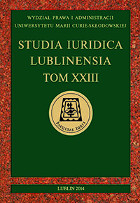Działalność lecznicza – pojęcie oraz formy i zasady wykonywania
Therapeutic activity – the notion, forms and rules of executing
Author(s): Agnieszka Wołoszyn-Cichocka, Grzegorz LubeńczukSubject(s): Economy, Law, Constitution, Jurisprudence, Health and medicine and law, Transformation Period (1990 - 2010), Present Times (2010 - today), Fiscal Politics / Budgeting
Published by: Wydawnictwo Naukowe Uniwersytetu Marii Curie-Sklodowskiej
Summary/Abstract: On 1 July 2011, the law of 15 April 2011 on the health care sector, which aimed to clarify and harmonize the legal forms of the health care provided, entered into force. In order to pursue the goal, many new terms, such as health care, health care facilities, health care facilities or non-contractors' health care facilities have been introduced. The legal concepts proposed by the legislature have been the source of numerous interpretative doubts. The definition of individual terms creates many difficulties in their correct interpretation. In many cases, doubts are so great that the questions of ratio legis, the internal coherence and the possibility of agreeing on the legal measures with the legal system applicable in the Republic of Poland. One of the sources of the difficulties of interpretation mentioned is the type of design from the definition of health care. The definition contained in the Act, which refers to imprecise phrases such as health care, health promotion, and didactic and research related to the provision of health services and health promotion, appears to be extremely general. There is also a doubt about the legal division of the health care sector into the regulated health sector under the Act of 2 July 2004 on freedom of trade and health care, which has not been regulated as such. The definition of the concept of health care also raises wide concerns. A reference to the fact that the health care institutions on the one hand may employ entrepreneurs and, on the other hand, other economic operators makes their classification more difficult in the case of acquiring the entrepreneurial status. Apparent problems were additionally complicated by the legal segregation of the non-entrepreneur health facilities. The creation of such a category of legal entities, with the emphasis on budgetary units and public autonomous administrative units in the field of health care, does not correspond to the entrepreneur's definition adopted in Poland. Similar imprecise difficulties arise from the imprecise legal regulation, according to which the shareholders of the BGB-Gesellschaft, the shareholders of the open trade company as well as the natural persons practicing a one-man trade within the framework of their doctor's practice were excluded from the definition of the health facilities. The above-mentioned question of interpretation makes it difficult to determine the personal and material scope of the law. Consequently, contrary to the intentions of the legislature to create transparent and clear definitions, the law on health does not exclude not only the inadequacies of the existing rules but also the terminological chaos already prevailing in this legal field.
Journal: Studia Iuridica Lublinensia
- Issue Year: 23/2014
- Issue No: 3
- Page Range: 65-87
- Page Count: 23
- Language: Polish

